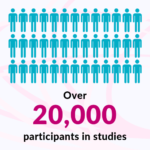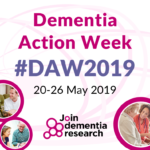All news
Over 20,000 research participants recruited through Join Dementia Research
5 August 2019

We’re pleased to announce that over 20,000 study participants have been involved in vital research thanks to Join Dementia Research. We would like to sincerely thank all the volunteers, researchers, champions and partners who have given their time so far. If you haven’t already, please sign up, and if you have, please help us spread the word so we can bring more volunteers and researchers together.
How does stigma impact people living with dementia?
30 July 2019

Research supported by University College London is investigating how people living with dementia talk about their diagnosis to others. As part of this study, the team are inviting people with a primary diagnosis of dementia to share their experiences of stigma, by taking part in a questionnaire.
Healthy lifestyle reduces dementia risk even in those with genetic risk factors
22 July 2019

A new study suggests that regular exercise, not smoking, drinking sensibly, and eating a healthy diet have been found to reduce risk of getting dementia even if a person has a higher genetic risk of developing the condition. There are some limitations to the study, but overall the findings are good news. We cannot change our genetics, but this study suggests that regardless of this, changing our lifestyles could help everyone reduce their dementia risk.
Driving and dementia: share your experience
4 July 2019

Help researchers to improve the guidance and support around driving after a dementia diagnosis by taking part in a survey to share your experience.
Widely used class of drugs linked to dementia
26 June 2019

Researchers have found that use of anticholinergics was linked with between a 6% and 49% increased risk of dementia, depending on the dose and duration of use. With this type of study, it is always difficult to prove direct cause and effect. Nevertheless, this is an important finding that needs looking into further. But it’s important that people do not stop taking any prescribed medicine without speaking to their doctor. The risk from stopping the medicine may be far higher than any dementia risk.
Can doing a daily crossword or Sudoku puzzle keep your brain young?
22 May 2019

In 2 linked studies, researchers found that people who said they did puzzles regularly did better on tests of cognitive ability. However, the research does not definitely show that doing puzzles made brains “sharper”. Or that doing puzzles staves off dementia in later life. It could be that people who have better cognitive abilities are more likely to do number or word puzzles in the first place.
Guest blog: Dementia Action Week 2019 | Taking the next step together
21 May 2019

In this blog for Dementia Action Week, Professor Martin Rossor reflects on how far dementia research has come, and looks ahead to how healthcare professionals, researchers and the public can take the next step together.
Dementia Action Week 2019
20 May 2019

This Dementia Action Week we’re asking healthcare professionals to talk to their patients about research opportunities.
New type of dementia discovered
2 May 2019

Researchers have identified a new form of dementia. Known as LATE, it shares many similarities with Alzheimer’s disease, but tends to lead to a more gradual decline in memory. LATE (limbic-predominant age-related TDP-43 encephalopathy) appears to be linked to the accumulation of a protein called TDP-43 in the brain, whereas Alzheimer’s is linked to the […]
LEARN to help people Join Dementia Research
3 April 2019

Join Dementia Research has helped more than 40,000 people connect with research studies over the past four years. As a result, researchers and their studies have massively benefitted, with more than 11,000 study enrollments in this time. However, if we are going to turn the corner and find ways to better prevent, diagnose, treat, care […]
